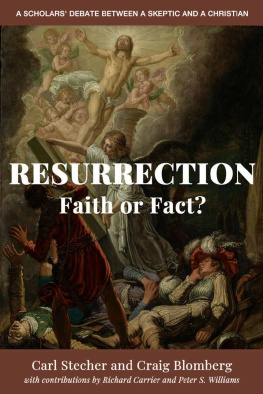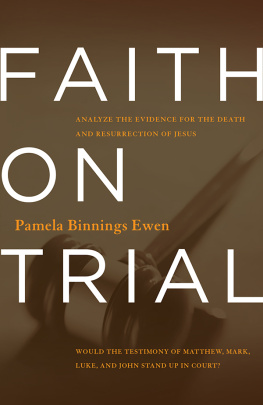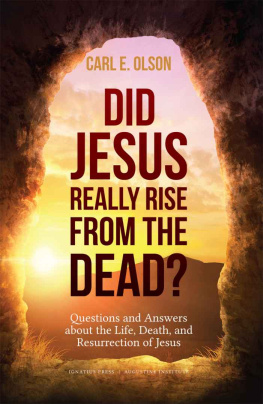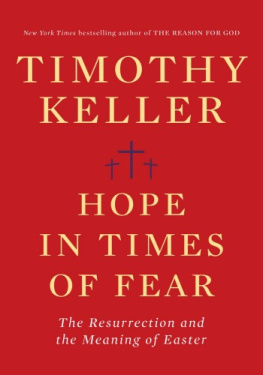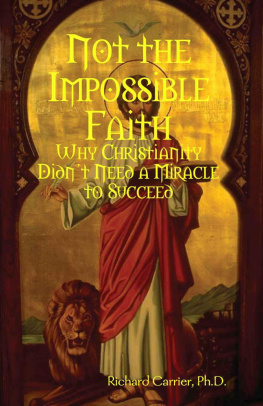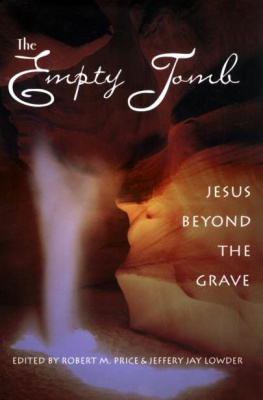

Pitchstone Publishing
Durham, North Carolina
Copyright 2019 by Carl Stecher, Craig Blomberg, Richard Carrier, and Peter S. Williams
Library of Congress Cataloging-in-Publication Data
Names: Stecher, Carl, author. | Blomberg, Craig L., 1955- author. | Carrier, Richard, 1969- author. | Williams, Peter S., author.
Title: Resurrection : faith or fact? A scholars debate between a skeptic and a Christian / Carl Stecher and Craig Blomberg ; with contributions by Richard Carrier and Peter S. Williams.
Description: Durham, North Carolina : Pitchstone Publishing, [2019] | Includes bibliographical references.
Identifiers: LCCN 2018049179 (print) | LCCN 2018054116 (ebook) | ISBN 9781634311755 (ePub) | ISBN 9781634311762 (ePDF) | ISBN 9781634311779 (mobi) | ISBN 9781634311748 (pbk. : alk. paper)
Subjects: LCSH: Jesus ChristResurrection. | Jesus ChristHistoricity. | Christianity and atheism.
Classification: LCC BT482 (ebook) | LCC BT482 .S74 2019 (print) | DDC 232/.5dc23
LC record available at https://lccn.loc.gov/2018049179
Contents

Introduction
Carl Stecher, Ph.D.

Was Jesus miraculously raised from the dead? For almost 2,000 years traditional Christians have positively answered this questionHe has risen indeed. For these Christians, Jesus resurrection has been the foundational doctrine of the faith. In Pauls words, if Christ was not raised, your faith has nothing to it If it is for this life only that Christ has given us hope, we of all people are most to be pitied (1 Corinthians 15:1719).
The purpose of this volume is to explore the evidence: is Jesus resurrection a fact of history? The debate brings together the eminent Christian scholar Craig Blomberg, author of more than twenty books on Christianity, and myself, a college professor with a strong background in history and a special interest in Christianity. For several decades I have focused on the resurrection question, discovering to my great surprise that despite the voluminous scholarship devoted to this question, including thousands of pages of scholarly books and journal articles and dozens of debates pitting Christian scholars against skeptical scholars, some very strong arguments against the resurrection as a fact of history have not been made.
Specifically, the case for the resurrection as fact rests upon the belief of some of Jesus original disciples that He had appeared to them, alive, three days after his execution by the ruling Romans. What has not received significant attention are the multiple possible natural explanations for the disciples resurrection belief, all of them based upon common, well-documented human behavior. My argument is that the Gospel accounts provide the only substantive evidence for resurrection, and that consequently we cannot know with any certainty what happened 2,000 years ago. The unexamined natural explanations are all plausible, conform to normal human behavior, and have been the subject of many university studies and experiments.
The debate in this volume is divided into five parts and structured to give maximum opportunity to test these natural explanations. The first part consists of statements by the four participating scholars in this debate. We share our worldviews and how we came to the beliefs we hold as individuals. Because our perceptions of reality are so fundamentally at variance, and because these differences so affect our perception of evidence, we agreed that these differences should be made clear from the beginning.
The second part begins with my case against the resurrection as a fact of history, followed by Craig Blombergs rebuttal and my rejoinder to Craigs rebuttal.
The third part begins with Craigs positive case for the resurrections historicity, followed by my rebuttal and Craigs rejoinder. This organization is designed to facilitate as much back and forth as possible.
The fourth part is devoted to commentary upon the two previous chapters of debate by first, Richard Carrier, a distinguished atheist scholar and author of several books defending naturalist explanations of history and the world, and by Peter S. Williams, a prominent British scholar and author of several books defending traditional Christian beliefs.
In the books fifth and final part, Craig and then I respond briefly to the assessments of Peter and Richard and make our final statements.
At the end of the book, we offer our suggested readings on the subject, with each participant nominating ten books for further study.
At times this debate will touch upon other, related questions. After all, Christian orthodoxy generally preaches that Jesus resurrection is central to the faith, because it is Gods sacrifice of his only Son. As a result, those who have the correct faith in Jesus and his sacrifice will receive eternal joy in Heaven, and those who do not have this faith will experience eternal torment in Hell (or else, as some think, annihilation). So context is important, and our debate will also at times touch upon the Christian teachings that God is all-powerful., omniscient, and morally perfect. The resurrection question finds its significance in this context.
Our purpose in this book is to test an essentially new challenge to the traditional case for Jesus resurrection as a fact of history, and to do this with mutual respect and an honest attempt by all four participants to find common ground when possible, and when it is not, to come to a better understanding of how our minds seem to work differently, and how sometimes what appears a clear truth to some seems clearly false to others.
I have collaborated previously with both Peter S. Williams and Craig Blomberg, and I consider them both to be good friends, despite our different beliefs. Having read several of Richard Carriers many books and watched his debates on YouTube, I am delighted that he has accepted our invitation to participate in this project; his contributions have been invaluable and many faceted. And to reflect the respect and collegial feelings of the four participants, we will often refer to each other by our first names.
Additional Acknowledgments: We are grateful to our two editors, Sharon Broll and Davida Rosenblum, for their many valuable suggestions and for their help in producing a clean manuscript. Without their help this project would never have come to completion.
PART ONE: HORIZONS
Living Without Gods
Carl Stecher, Ph.D.

I am often asked how I came to my present skepticism about the claims of traditional Christianity. From kindergarten through high school I lived in Sheboygan, Wisconsin, with my parents, my sister, who is two years my senior, and my brother, twelve years my junior. We attended as a family the local Congregational church every other Sunday; alternate weekends we spent with our grandparents in Milwaukee. The Harvard-educated minister of the Sheboygan church often cited Paul Tillich. I remember something about the ground of all being. I dont think of either of my parents as being religiouswe didnt say grace at the dinner table or discuss religion. My mom later worked as a church organist and choir director and my father served as a deacon, despite being, according to my sister, a nonbeliever. Curiously, although I was close to my parents, I dont remember ever discussing God or religion with them.
Next page
